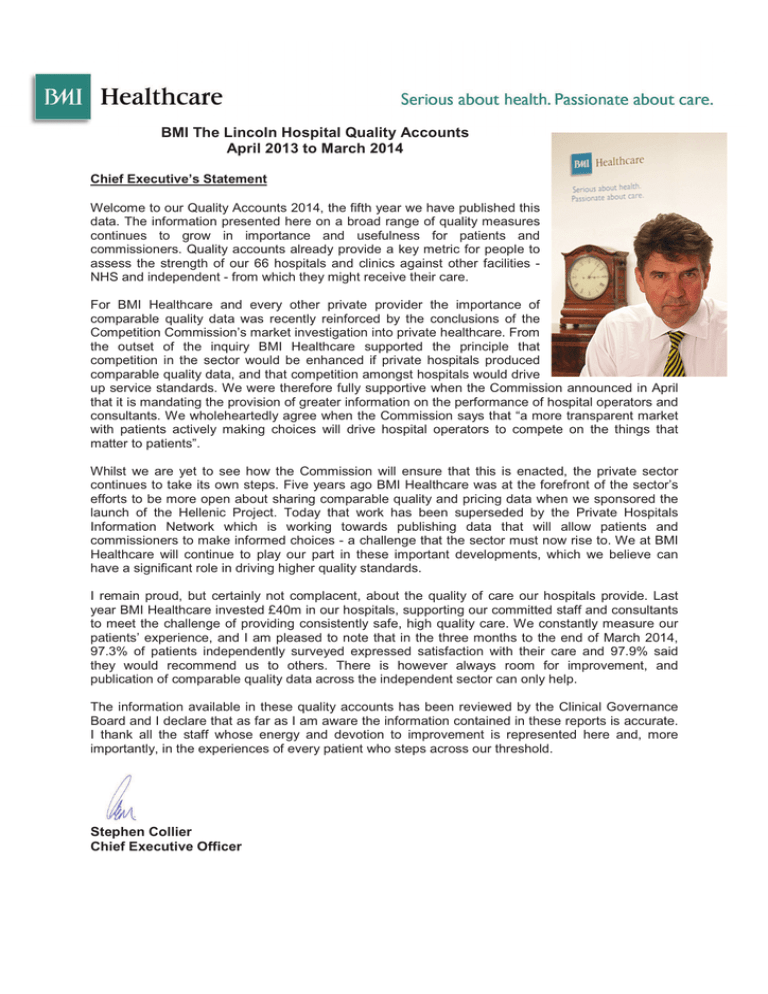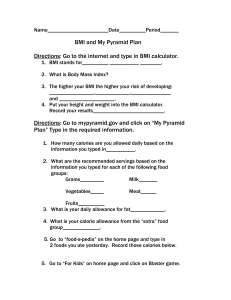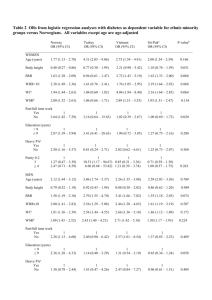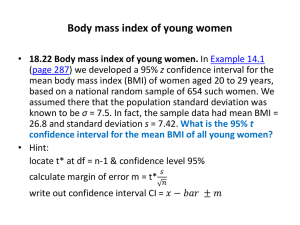
BMI The Lincoln Hospital Quality Accounts
April 2013 to March 2014
Chief Executive’s Statement
Welcome to our Quality Accounts 2014, the fifth year we have published this
data. The information presented here on a broad range of quality measures
continues to grow in importance and usefulness for patients and
commissioners. Quality accounts already provide a key metric for people to
assess the strength of our 66 hospitals and clinics against other facilities NHS and independent - from which they might receive their care.
For BMI Healthcare and every other private provider the importance of
comparable quality data was recently reinforced by the conclusions of the
Competition Commission’s market investigation into private healthcare. From
the outset of the inquiry BMI Healthcare supported the principle that
competition in the sector would be enhanced if private hospitals produced
comparable quality data, and that competition amongst hospitals would drive
up service standards. We were therefore fully supportive when the Commission announced in April
that it is mandating the provision of greater information on the performance of hospital operators and
consultants. We wholeheartedly agree when the Commission says that “a more transparent market
with patients actively making choices will drive hospital operators to compete on the things that
matter to patients”.
Whilst we are yet to see how the Commission will ensure that this is enacted, the private sector
continues to take its own steps. Five years ago BMI Healthcare was at the forefront of the sector’s
efforts to be more open about sharing comparable quality and pricing data when we sponsored the
launch of the Hellenic Project. Today that work has been superseded by the Private Hospitals
Information Network which is working towards publishing data that will allow patients and
commissioners to make informed choices - a challenge that the sector must now rise to. We at BMI
Healthcare will continue to play our part in these important developments, which we believe can
have a significant role in driving higher quality standards.
I remain proud, but certainly not complacent, about the quality of care our hospitals provide. Last
year BMI Healthcare invested £40m in our hospitals, supporting our committed staff and consultants
to meet the challenge of providing consistently safe, high quality care. We constantly measure our
patients’ experience, and I am pleased to note that in the three months to the end of March 2014,
97.3% of patients independently surveyed expressed satisfaction with their care and 97.9% said
they would recommend us to others. There is however always room for improvement, and
publication of comparable quality data across the independent sector can only help.
The information available in these quality accounts has been reviewed by the Clinical Governance
Board and I declare that as far as I am aware the information contained in these reports is accurate.
I thank all the staff whose energy and devotion to improvement is represented here and, more
importantly, in the experiences of every patient who steps across our threshold.
Stephen Collier
Chief Executive Officer
Hospital Information
The BMI Lincoln Hospital has 32 beds with all rooms offering the privacy and comfort of en-suite
facilities, TV and telephone. The hospital has 2 theatres including endoscopy.
The hospital provides services such as physiotherapy, pain management, cardiology clinics and
MRI scanning. These facilities combined with the latest in technology and on-site support
services; enable our consultants to undertake a wide range of procedures from routine
investigations to complex surgery. This specialist expertise is supported by caring and
professional medical staff, with dedicated nursing teams and Resident Medical Officers on duty
24 hours a day, providing care within a friendly and comfortable environment.
Choose and book NHS work is carried out at BMI The Lincoln Hospital with 35% of NHS
patients covering overall work.
BMI Healthcare are registered as a provider with the Care Quality Commission (CQC) under the
Health & Social Care Act 2008. BMI The Lincoln is registered as a location for the following
regulated services:•
•
•
Treatment of disease, disorder and injury
Surgical procedures
Diagnostic and screening
The CQC carried out an unannounced inspection on 11 and 12 February 2014 and found
YĐŚĞĐŬƐ;>ĂƚĞƐƚƌĞƉŽƌƚƉƵďůŝƐŚĞĚŽŶϳDĂƌĐŚϮϬϭϰͿ
dƌĞĂƚŝŶŐƉĞŽƉůĞǁŝƚŚƌĞƐƉĞĐƚĂŶĚŝŶǀŽůǀŝŶŐƚŚĞŵŝŶƚŚĞŝƌĐĂƌĞ
WƌŽǀŝĚŝŶŐĐĂƌĞ͕ƚƌĞĂƚŵĞŶƚΘƐƵƉƉŽƌƚƚŚĂƚŵĞĞƚƐƉĞŽƉůĞΖƐŶĞĞĚƐ
ĂƌŝŶŐĨŽƌƉĞŽƉůĞƐĂĨĞůLJΘƉƌŽƚĞĐƚŝŶŐƚŚĞŵĨƌŽŵŚĂƌŵ
^ƚĂĨĨŝŶŐ
DĂŶĂŐĞŵĞŶƚ
Summary of inspection
During our inspection we spoke with six people that used the service and four people’s
relatives. One person we spoke with told us. “I think it’s absolutely outstanding. The staff
are really friendly.” Another person said, “There’s not a single thing I could criticise. I’ve
been consulted about everything.” We found that before people received any care or
treatment they were asked for their consent and the provider acted in accordance with
their wishes. We saw people’s care and treatment reflected relevant research and
guidance. When we examined care records we found care and treatment was not
always planned in a way that was intended to ensure people’s safety because
assessments of risk were not always completed fully or correctly. We found there were
arrangements in place to deal with foreseeable emergencies. We also found appropriate
arrangements were in place in relation to obtaining, recording, storing and administering
medicines. We spoke with seven members of staff and found they received appropriate
professional development and were able, from time to time, to obtain further relevant
qualifications. We found people were made aware of the complaints system and this
was provided in a way they could understand.
Action plan following CQC visit feedback 11th&12th Feb 2014
Issue identified
Action taken
Date for
review/completion
Risk assessments
(particular around pressure
area care) being completed
but actions relating to score
not documented in all
cases.
Director of Clinical
Services has met with
Ward Lead to discuss
training requirements and
training schedule put in
place to revisit training.
Complete – 12.02.14
NEWS – Felt that actions
from score not documented
Template example
developed and shared
with ward and theatre
teams.
Review for continued
compliance by end of Feb
2014 – completed Feb
2014
Actions from the NEWS
screen are documented
within the general care
plan with escalation
process followed
(additional evidence
provided to inspector)
Additional evidence
shared with inspector
12.02.14
The BMI Lincoln has a local framework through which clinical effectiveness, clinical incidents
and clinical quality is monitored and analysed. Where appropriate, action is taken to
continuously improve the quality of care. This is through the work of a multidisciplinary group
and the Medical Advisory Committee.
Regional Clinical Quality Assurance Groups monitor and analyse trends and ensure that the
quality improvements are operationalised. There has been development of
At corporate level the Clinical Governance Board has an overview and provides the strategic
leadership for corporate learning and quality improvement.
There has been ongoing focus on robust reporting of all incidents, near misses and outcomes.
Data quality has been improved by ongoing training and database improvements. New reporting
modules have increased the speed at which reports are available and the range of fields for
analysis. This ensures the availability of information for effective clinical governance with
implementation of appropriate actions to prevent recurrences in order to improve quality and
safety for patients, visitors and staff.
At present we provide full, standardised information to the NHS, including coding of procedures,
diagnoses and co-morbidities and PROMs for NHS patients.There are additional external
reporting requirements for CQC, Public Health England (Previously HPA) CCGs and Insurers
BMI is a founding member of the Private Healthcare Information Network (PHIN) UK – where
we produce a data set of all patient episodes approaching HES-equivalency and submit this to
PHIN for publication. The data is made available to common standards for inclusion in
comparative metrics, and is published on the PHIN website http://www.phin.org.uk. This website
gives patients information to help them choose or find out more about an independent hospital
including the ability to search by location and procedure.
1. Safety
1.1 Infection prevention and control
The focus on infection prevention and control continues under
the leadership of the Group Head of Infection Prevention and
Control, in liaison with the link nurse in BMI The Lincoln
Hospital.
The focus on infection prevention and control continues under
the leadership of the Group Director of Infection Prevention and
Control and Group Head of Infection Prevention and Control, in
liaison with the Infection Prevention and Control Lead BMI The
Lincoln Hospital
We have had: • Zero cases of MRSA bacteraemia in the last year (NHS 1.17cases/100,000 bed days).
• Zero MSSA bacteraemia cases /100,000 bed days
• Zero E.coli bacteraemia cases/ 100,000 bed days
• Zero cases of hospital apportioned Clostridium difficile in the last 12 months.
• SSI data is also collected and submitted to Public Health England for orthopaedic
surgical procedures. Our rates of infection are;
Infection Prevention and Control (IPC) environmental and clinical practice audits are carried out
within all departments of the hospital according to an annual audit schedule devised by the
corporate IPC team. These are performed using the Infection Prevention Society’s (IPS) Quality
Improvement Tools (QIT).
QIT audit results are reviewed by the IPC team and areas of concern are re-visited at more
regular intervals with action plans being devised for desired improvements.
Challenges presented by the general hospital environment throughout the QIT audits have now
been addressed to ensure a clinical environment fit for purpose.
Changes to clinical practice have been implemented as a direct result of the QIT audits. These
changes have been based on risk assessment, widespread clinical and non-clinical education
from the IPC team, controlled change management and effective communication.
On re-audit of the areas of concern highlighted in the QIT schedule qualitative and quantitative
improvements in clinical practice and environment have been recorded and reported by the IPC
team. Overall clinical knowledge regarding IPC, prevention of HCAIs and reduction of the risk of
cross contamination has improved throughout the hospital.
High Impact Intervention (HII) care bundles for peripheral cannulas, urinary catheters, and
Surgical Site Infection (SSI) continue to be implemented by the IPC team
BMI The Lincoln Hospital mirror the guidelines Antibiotic Formulary and Prescribing advice for
Adult Patients (Version 6.7 Effective May 2014) issued by the Northern Lincolnshire & Goole
Hospitals NHS Foundation Trust (NLAG) and United Lincolnshire Hospitals NHS Trust (ULHT).
Environmental cleanliness is also an important factor in infection prevention and our patients
rate the cleanliness of our facilities highly.
ϵϳ͘ϰ
ϵϳ͘Ϯ
ϵϳ
ϵϲ͘ϴ
WĂƚŝĞŶƚƐĂƚŝƐĨĂĐƚŝŽŶй
ϵϲ͘ϲ
ϵϲ͘ϰ
ϵϲ͘Ϯ
ZŽŽŵ
ůĞĂŶůŝŶĞƐƐ
ĂƚŚƌŽŽŵ
ůĞĂŶůŝŶĞƐƐ
1.2 Patient Led Assessment of the Care Environment (PLACE)
CLEANLINESS
BMI LINCOLN HOSPITAL
89.13%
FOOD AND
PRIVACY
HYDRATION DIGNITY AND
WELLBEING
94.18%
96.00%
CONDITION
APEARANCE AND
MAINTENANCE
85.53%
Introduced in April 2013 Patient Led Inspections of the Care Environment (PLACE) aims to
strengthen and formalise the role of patients in both the content of the assessment and the
delivery of inspections. It also provides an opportunity to review all aspects of the assessment
and the supporting guidance with a view to producing more robust data and a more consistent
approach
We believe a patient should be cared for with compassion and dignity in a clean, safe
environment. Where standards fall short, they should be able to draw it to the attention of
managers and hold the service to account. PLACE assessments will provide motivation for
improvement by providing a clear message, directly from patients, about how the environment
or services might be enhanced.
In 2013 we introduced PLACE, which is the new system for assessing the quality of the patient
environment, replacing the old Patient Environment Action Team (PEAT) inspections.
The assessments involve patients and staff who assess the hospital and how the environment
supports patient’s privacy and dignity, food, cleanliness and general building maintenance. It
focuses entirely on the care environment and does not cover clinical care provision or how well
staff are doing their job.
1.3 Venous Thrombo-embolism (VTE)
BMI Healthcare, holds VTE Exemplar Centre status by the Department of Health across its
whole network of hospitals including, The BMI Lincoln Hospital. BMI Healthcare was awarded
the Best VTE Education Initiative Award category by Lifeblood in February 2013 and were the
Runners up in the Best VTE Patient Information category.
We see this as an important initiative to further assure patient safety and care. We audit our
compliance with our requirement to VTE risk assessment every patient who is admitted to our
facility and the results of our audit on this has 100% compliance. We will continue to audit and
monitor results to ensure continued compliance.
BMI The Lincoln Hospital reports the incidence of Venous Thromboembolism (VTE) through the
corporate clinical incident system. It is acknowledged that the challenge is receiving information
for patients who may return to their GPs or other hospitals for diagnosis and/or treatment of VTE
post discharge from the Hospital. As such we may not be made aware of them. We continue to
work with our Consultants and referrers in order to ensure that we have as much data as
possible.
BMI Lincoln has a low rate of VTE and risk assessment and appropriate prophylaxis will
continue to be a priority.
DVT Rate (per 100 admissions)
Ϭ͘Ϭϴ
Ϭ͘Ϭϳ
Ϭ͘Ϭϲ
Ϭ͘Ϭϱ
ϮϬϭϮ
ϮϬϭϯ
ϮϬϭϰ
Ϭ͘Ϭϰ
Ϭ͘Ϭϯ
Ϭ͘ϬϮ
Ϭ͘Ϭϭ
Ϭ
ϮϬϭϮ
ϮϬϭϯ
ϮϬϭϰ
2. Effectiveness
2.1 Patient reported Outcomes (PROMS)
Patient Reported Outcome Measures (PROMs) are a means of collecting information on the
effectiveness of care delivered to NHS patients as perceived by the patients themselves.
PROMs is a Department of Health led programme.
For the current reporting period, the tables below demonstrate that the health gain between
Questionnaire 1 (pre-operative) and Questionnaire 2 (post–operative) for patients undergoing
hip replacement and knee replacement at The BMI Lincoln Hospital.
For the current reporting period, the tables below demonstrate that the health gain between
Questionnaire 1 (pre-operative) and Questionnaire 2 (post–operative) for patients undergoing
hip replacement at the Lincoln Hospital is marginally higher than the average for England.
For knee replacement surgery Lincoln Hospital the outcome is above the average for England.
Oxford Hip Score average
April 12 –
Mar 13
BMI The
Lincoln
Q1
Q2
Health gain between reporting
periods
21.019
40.611
21.473
17.907
39.224
21.317
England
Copyright © 2011 Re-used with the permission of The Health and Social Care Information Centre. All rights reserved.'
Oxford Knee Score average
April 12 –
Mar 13
BMI The
Lincoln
Q1
Q2
Health gain between reporting
periods
21.884
38.274
17.60
18.893
34.902
16.01
England
Copyright © 2013, The Health and Social Care Information Centre. All Rights Reserved.
2.2 Enhanced Recovery Programme (ERP)
The ERP is about improving patient outcomes and speeding up a patient’s recovery after
surgery. ERP focuses on making sure patients are active participants in their own recovery and
always receive evidence based care at the right time. It is often referred to as rapid recovery, is
a new, evidence-based model of care that creates fitter patients who recover faster from major
surgery. It is the modern way for treating patients where day surgery is not appropriate.
ERP is based on the following principles:1. All Patients are on a pathway of care
a. Following best practice models of evidenced based care
b. Reduced length of stay
2. Patient Preparation
a. Pre Admission assessment undertaken
b. Group Education sessions
c. Optimizing the patient prior to admission – i.e HB optimisation, control comorbidities, medication assessment – stopping medication plan.
d. Commencement of discharge planning
3. Proactive patient management
a. Maintaining good pre-operative hydration
b. Minimising the risk of post-operative nausea and vomiting
c. Maintaining normothermia pre and post operatively
d. Early mobilisation
4. Encouraging patients have an active role in their recovery
a. Participate in the decision making process prior to surgery
b. Education of patient and family
c. Setting own goals daily
d. Participate in their discharge planning
BMI Lincoln hospital currently utilise multidisciplinary team working to maximise patient
outcomes. Group physiotherapy sessions are also utilised to increase patient participation and
support and reduce average length of patient stay.
Following these principles BMI The Lincoln Hospital average length of stay (AVLOS) for hip and
knee replacements are:
Total HIP Replacement 2013/14
3.1 days
Total KNEE Replacement 2013/14
3
days
The ERP Steering committee will continue to
•
Review processes for the patient’s pathway at the BMI The Lincoln Hospital.
•
Promote integration and partnership working across the departments
•
Review top 10 procedures regularly against, best practice and local pathways.
•
Implement changes to the patient’s pathway ensuring that the quality of care and good
patient outcomes are improved or maintained.
•
Monitor key performance indicators (KPI) monthly and make any recommendations and
develop action plans and implement changes as required.
2.3 Unplanned Readmissions within 31 days and unplanned returns to theatre per 100
admissions.
Unplanned readmissions and unplanned returns to theatre are normally due to a clinical
complication related to the original surgery.
Ϭ͘ϲ
Ϭ͘ϱ
Ϭ͘ϰ
Ϭ͘ϯ
ϮϬϭϮ
ϮϬϭϯ
ϮϬϭϰ
Ϭ͘Ϯ
Ϭ͘ϭ
Ϭ
ZĞĂĚŵŝƐƐŝŽŶ
ǁŝƚŚŝŶϯϭ
ĚĂLJƐ
dŚĞĂƚƌĞ
ƌĞƚƵƌŶƐ
BMI Lincoln Hospital has a low rate overall for unplanned readmissions and theatre returns per
100 admissions and reduction from year 2012/13.
There have been no trends of concern identified.
3. Patient experience
3.1 Patient satisfaction
BMI Healthcare is committed to providing the highest levels of quality of care to all of our
patients. We continually monitor how we are performing by asking patients to complete a patient
satisfaction questionnaire. Patient satisfaction surveys are administered by an independent third
party.
BMI Lincoln Hospital analyses the monthly reports they receive, and implements appropriate
action to address any issues of disatisfaciton or areas which have been scored lower than
others.
A project to improve on excellence has been ongoing over a number of years. The areas of
focus have been based on our patient feedback e.g. admisison and discharge processes,
nursing care and this has resulted in a year on year increase in patient satisfaction scores.
Other areas of focus for this year are catering and departure
ϭϬϬ
ϵϴ
ĐĐŽŵŵŽĚĂƚŝŽŶ
ϵϲ
ϵϬ
ĚŵŝƐƐŝŽŶ
ĂƚĞƌŝŶŐ
ĞƉĂƌƚƵƌĞ
EƵƌƐŝŶŐ
ϴϴ
KǀĞƌĂůůƋƵĂůŝƚLJ
ϵϰ
ϵϮ
ϴϲ
ϮϬϭϯ
ϮϬϭϰ
There has been an increase in scores in all areas of patient satisfaction from last reporting
period and this is evidence of the commitment and actions taken by the hospital to continually
improve patients’ experience.
3.2 Complaints
In addition to providing all patients with an opportunity to complete a satisfaction survey BMIdŚĞ
>ŝŶĐŽůŶHospital actively encourages feedback both informally and formally. Patients are
supported through a robust complaints procedure, operated over three stages:
Stage 1: Hospital resolution
Stage 2: Corporate resolution
Stage 3: Patients can refer their complaint to independent adjudication if they are not satisfied
with the outcome at the other 2 stages.
Ϯϱ
ϮϬ
ϭϱ
tƌŝƚƚĞŶĐŽŵƉůĂŝŶƚƐ
ϭϬ
ϱ
Ϭ
ϮϬϭϮ
ϮϬϭϯ
ϮϬϭϰ
Common theme to complaints identified around finance and billing. BMI The Lincoln hospital will
continue to provide information to patients in written and verbal communication and to work with
BMI Business Services to provide a clear and open process.
4. CQUINS
ϭϬϬ
ϵϬ
ϴϬ
ϳϬ
ϲϬ
ϱϬ
ϰϬ
ϯϬ
ϮϬ
ϭϬ
Ϭ
&&d
^ĂĨĞƚLJƚŚĞƌŵŽŵĞƚĞƌ
sd
ĂƌĞƵŶĚůĞƐ
&ŽůůŽǁhƉ
D
ϭƐƚYƚƌ
ϮŶĚYƚƌ
ϯƌĚYƚƌ
ϰƚŚYƚƌ
The BMI Lincoln Hospital participated in:
FFT Implementation: achieving full implementation / phased expansion in line with national
milestones
FFT Response Rate - 20% by Q4 (current response rate) It will highlight priorities for local
action.
Safety Thermometer; Requires monthly surveying all appropriate patients to collect data on
pressure ulcers, falls, UTI in patients with catheters and VTE.
VTE Assessment: % of adult inpatients who have had a VTE risk assessment on admission to
hospital using the clinical criteria of the national tool
Care Bundles: Number of patients who received catheters and were audited for insertion
surgical care bundles (10 or actual number if less)
Follow up calls: Number of patients who had received a post-surgical telephone follow-up call
(or 3 attempts at contact) within 48 hours of discharge
Lifestyle Interventions: Patients with BMI >30 offered advice and signposted to appropriate
services
5. National Clinical Audits
The BMI Lincoln Hospital was only eligible to participate in National Joint Registry audit and all
joint replacements are submitted to this
6. Research
No NHS patients were recruited to take part in research.
7. Priorities for service development and improvement
Ongoing engagement with CCG commissioners to enhance patient choice and service
delivery to NHS patients to be measured by agreed quality indicators
Ensure compliance with Care Bundles have been effectively implemented to be measured by
infection rates.
Promote collection of PROMS for hip and knee replacement for private patients
Further develop and enhance engagement with Health Improvement Team with emphasis on
dementia assessment and post-operative pain management
Improvement in patient satisfaction scores for catering and the discharge process.
8. Mandatory Quality Indicators
8.1 The value and banding of the summary hospital-level mortality indicator (SHMI) for BMI The
Lincoln Hospital for the reporting period.
Unit
0
Reporting Periods
(at least last two
reporting periods)
Oct 13 – May 14
National
Average
Highest National
Score
Lowest National
Score
1.0006
1.1822
0.6735
SHMI data is not available from HSCIC therefore unable to provide figures on Summary of
Hospital-level Mortality Indicators as this publication is not available until October 2014.
However, whilst not a complete like for like comparison, number of mortalities at BMI The
Lincoln Hospital have been included.
8.2 The BMI The Lincoln Hospital patient reported outcome measures scores for
(i) Groin hernia surgery
Unit
Reporting Periods
National
Highest National
Lowest National
(at least last two
Average
Score
Score
reporting periods)
*
Apr 13 – Mar 14
0.083
0.157
0.014
* = less than 30 patients going through the process, meaning that the site cannot be scored
The BMI The Lincoln Hospital considers that this data is as described for the following reasons
as less than 30 patients going through the process, meaning that the site cannot be scored
(ii) Varicose vein surgery
Unit
**
Reporting Periods
(at least last two
reporting periods)
Apr 13 – Mar 14
National
Average
Highest National
Score
Lowest National
Score
-8.738
8.172
-15.918
Please note that the data provided by HSCIC did not give any data in terms of Varicose Veins
and therefore none can be reported.
(iii) Hip replacement surgery
Unit
21.437
Reporting Periods
(at least last two
reporting periods)
Apr 13 – Mar 14
National
Average
Highest National
Score
Lowest National
Score
21.280
24.684
17.214
The BMI The Lincoln Hospital considers that this data is as described for the following reasons
•
Development of ERP within BMI The Lincoln Hospital
The BMI The Lincoln Hospital intends to take the following actions to improve this score, and so
the quality of its services
•
•
raise standards through sharing best practices
develop corporately care pathways that achieve the best possible results for the patients
(iv) Knee replacement surgery during the reporting period.
Unit
17.60
Reporting Periods
(at least last two
reporting periods)
Apr 13 – Mar 14
National
Average
Highest National
Score
Lowest National
Score
15.99
20.37
12.2
The BMI The Lincoln Hospital considers that this data is as described for the following reasons
•
Development of ERP within BMI The Lincoln Hospital
The BMI The Lincoln Hospital intends to take the following actions to improve this score, and so
the quality of its services
•
•
raise standards through sharing best practices
develop corporately care pathways that achieve the best possible results for the patients
8.3 (i) The percentage of patients aged 0-14 readmitted to a hospital which forms part of BMI
The (Lincoln Hospital) within 28 days of being discharged from a hospital which forms part of
the hospital during the reporting period.
Unit
N/A
Reporting Periods
(at least last two
reporting periods)
National
Average
Highest National
Score
Lowest National
Score
11.45
14.35
7.96
BMI The Lincoln Hospital considers that this data is as described for the following reasons:
0-14 years not treated at BMI The Lincoln Hospital.
8.3. (ii)The percentage of patients aged 15 or over readmitted to a hospital which forms part
of the BMI The Lincoln Hospital within 28 days of being discharged from a hospital which forms
part of the hospital during the reporting period.
Unit
0.42%
Reporting Periods
(at least last two
reporting periods)
Apr 13 – Mar 14
National
Average
Highest National
Score
Lowest National
Score
10.01
14.51
5.54
8.4 The BMI The Lincoln Hospital responsiveness to the personal needs of its patients during
the reporting period.
Unit
95.72%
Reporting Periods
(at least last two
reporting periods)
2013-2014
National
Average
Highest National
Score
Lowest National
Score
68.1
84.4
57.4
BMI The Lincoln Hospital intends to take the following actions to improve this percentage, and
so the quality of its services, by reviewing menus with corporate teams, continued programme
of refurbishment and review of discharge process.
8.5 The percentage of patients who were admitted toBMI The Lincoln Hospital and who were
risk assessed for venous thromboembolism during the reporting period.
Unit
100%
Reporting Periods
(at least last two
reporting periods)
Apr 13 – May 14
National
Average
Highest National
Score
Lowest National
Score
96
100
79
The BMI The Lincoln Hospital will take the following actions to maintain this score, and so the
quality of its services, by continued audit and interventions where required.
8.6 The rate per 100,000 bed days of cases of C difficile infection reported within the BMI The
Lincoln Hospital amongst patients aged 2 or over during the reporting period.
Unit
0
Reporting Periods
(at least last two
reporting periods)
Apr 13 – Mar 14
National
Average
Highest National
Score
Lowest National
Score
17.3
30.8
0
The BMI The Lincoln Hospital intends to maintain this rate by continuing to undertake IPC audit,
deliver and share best practice.
8.7 The number and, where available, rate of patient safety incidents reported within the BMI
The Lincoln Hospital during the reporting period, and the number and percentage of such
patient safety incidents that resulted in severe harm or death.
Number of patient safety incidents reported
Unit
9.6
Reporting Periods
(at least last two
reporting periods)
Apr 13 – Mar 14
National
Average
Highest National
Score
Lowest National
Score
44.55
1,810
0
National
Average
Highest National
Score
Lowest National
Score
7.76
30.95
1.68
Rate of patient safety incidents reported
Unit
4.1
Reporting Periods
(at least last two
reporting periods)
Apr 13 – Mar 14
Number of patient safety incidents that resulted in severe harm or death
Unit
0
Reporting Periods
(at least last two
reporting periods)
Apr 13 – Mar 14
National
Average
Highest National
Score
Lowest National
Score
0.64
28
0
Percentage of patient safety incidents that resulted in severe harm or death
Unit
0%
Reporting Periods
(at least last two
reporting periods)
Apr 13 – Mar 14
National
Average
Highest National
Score
Lowest National
Score
0.9
2.9
0.0
The BMI The Lincoln Hospital has taken the following actions to maintain this score and so the
quality of its services, by continual audit and review to ensure best practice.
8.8 The percentage of staff employed by the BMI The Lincoln Hospital during the reporting
period, who would recommend BMI The Lincoln Hospital as a provider of care to their family or
friends.
Unit
89.64%
Reporting Periods
(at least last two
reporting periods)
2014
National
Average
Highest National
Score
Lowest National
Score
64.58
96.43
33.73
Non-Mandatory Quality Indicators
9.1 The percentage of patients who received care as inpatients or discharged from A &E during
the reporting period, who would recommend the (name of hospital) as a provider of care to their
family or friends.
Unit
89.63%
Reporting Periods
(at least last two
reporting periods)
Jun 13 – Jan 14
National
Average
66.23
Highest National
Score
94.38
Lowest National
Score
35.63
BMI The Lincoln Hospital intends to take the following actions to improve this percentage, and
so the quality of its services, by reviewing menus with corporate teams, continued programme
of refurbishment and review of discharge process.




